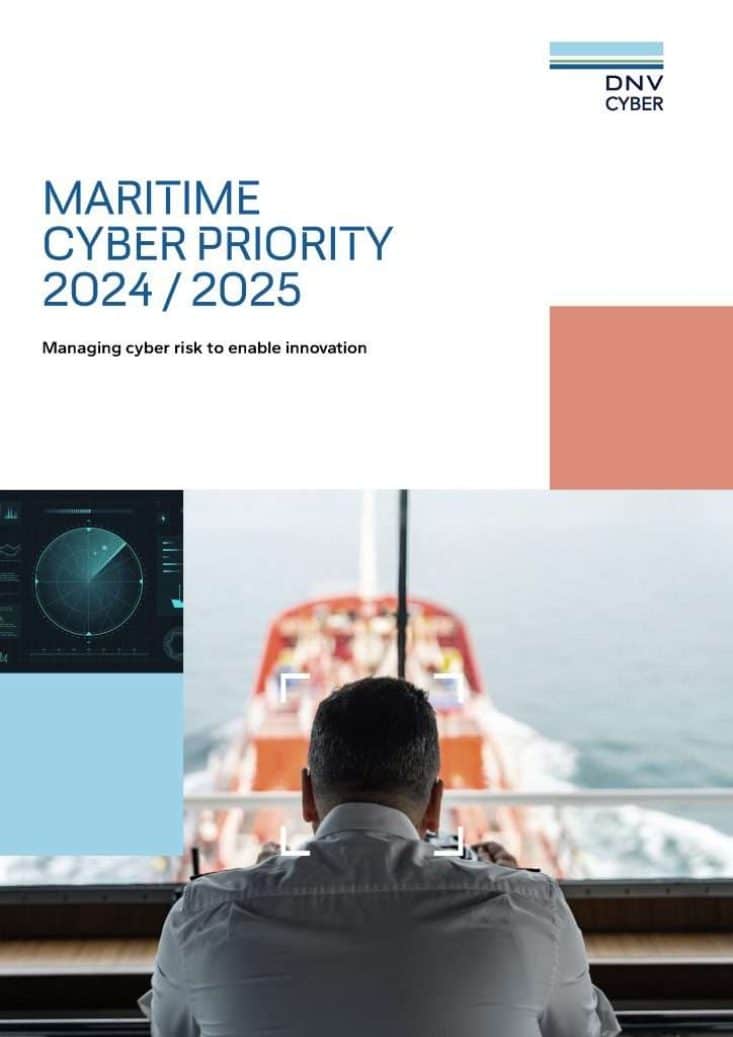Maritime appetite for cyber risk notably higher than other key industries, new report reveals

A recent report by DNV shows that most maritime professionals think the industry should accept higher cyber risks if it allows for new technologies and innovation. According to the report, 61% of maritime experts believe that taking on more cyber risks is worth it to drive progress. This willingness to handle cyber threats is greater in the maritime industry than in other key sectors like energy, manufacturing, and healthcare.
Rising Cyber Vulnerabilities in the Maritime Sector
The industry’s eagerness to embrace digitalization comes at a time when cyber threats are on the rise. About 71% of the nearly 500 maritime professionals surveyed by DNV said their company’s industrial equipment is more exposed to cyber-attacks than ever before. Additionally, 71% of respondents agree that their company leaders see cyber security as the biggest threat facing their business today.
Knut Ørbeck-Nilssen, CEO of Maritime at DNV, emphasized the importance of security, saying, “In the maritime industry, we need to balance our goals for digital transformation and going green with a strong focus on protecting our people, ships, and systems. Cyber-attacks are a growing threat, but if we handle cyber risks properly, we can lead the way in making our industry and society more secure.”
Balancing Digital Innovation and Cyber Threats
As the maritime world moves towards greener and safer operations, it is becoming more dependent on digital technology. Ship owners, ports, and other maritime businesses see big opportunities in new tech, including advanced data analysis, the Internet of Things (IoT), artificial intelligence (AI), high-speed satellite communication, and automated operations. These technologies promise to make maritime activities more efficient, but they also increase the risk of cyber-attacks.
Despite these risks, maritime professionals are generally confident that the industry is prepared. According to the report, 83% of those surveyed believe their company has a solid cyber security plan. Moreover, 71% are sure that their company could recover quickly from a cyber-attack.
This optimism may be due to increased spending on cyber security. Nearly three-quarters (73%) of maritime professionals said their organizations are investing more in cyber security this year than last. Many companies are taking steps to guard against disruptions, theft of private data, physical harm, or the grounding of ships.
ABS Grants Approval in Principle to SHI for Cyber Resilience
Are Maritime Companies Truly Prepared?
Although there is greater awareness of cyber risks and a rise in security spending, some experts worry that the industry may not be as prepared as it thinks. Only 53% of professionals are confident their company can fully track risks in the supply chain. This is worrying, as recent cyber-attacks have focused heavily on supply chains.
Another concern is the difference between IT security and operational technology (OT) security. OT is connected to physical equipment like sensors, automated systems, and safety controls. While 68% of experts feel their IT security is strong, fewer are as confident in their OT security. Also, 76% believe that their company’s training for cyber threats isn’t advanced enough to tackle sophisticated risks.
Svante Einarsson, Head of Maritime Cybersecurity at DNV Cyber, warns that the reality is complex. “Organizations may feel secure as they invest more in managing cyber risk, but they face very skilled attackers. We must protect both IT and OT and be ready to respond if an attack happens.”
Criminal Threats and the Need for Cooperation
There are additional concerns due to growing geopolitical tensions and an increase in cybercrime. Many experts are especially worried about criminal gangs that profit from ransomware attacks. In fact, 79% of professionals now see ransomware as a big threat, up from 56% last year.
DNV’s report, titled Maritime Cyber Priority 2024/25: Managing Cyber Risk to Enable Innovation, points out four major challenges for the industry:
- Having experts who know how to build strong cyber defenses for new systems and ships.
- Improving detection and response to limit the impact of attacks on marine systems.
- Assigning clear roles and responsibilities for OT cyber security, both at sea and on land.
- Securing all the parts and connections in complex supply chains.
A strong 95% of maritime professionals want more cooperation on cyber security between companies in different industries. Einarsson emphasizes the need for sharing experiences: “The maritime industry and other key sectors must work together and share their cyber security successes and failures to create better safety practices for everyone.”
